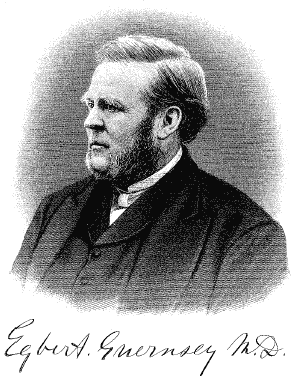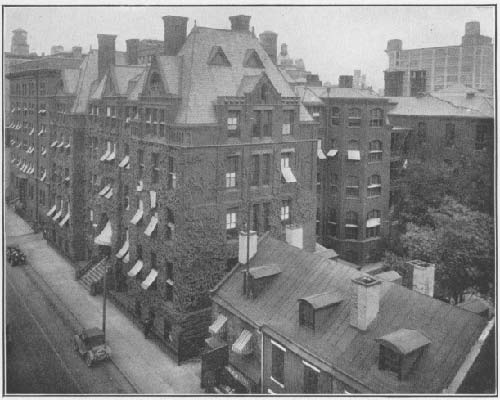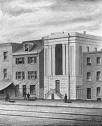The Guernsey Family and Homeopath
April 15, 2008
 The Guernsey family
gave us one Professor of Materia Medica and Professor of the Theory and
Practice of Medicine in the Homœopathic Medical College of New
York, one Professor of
Obstetrics and Diseases of Women and Children in the Homœopathic
Medical College of
Pennsylvania, a
President of the Homeopathic Medical Society of the State of
Pennsylvania and
Vice-President of the Philadelphia County Homœopathic Medical
Society and two jobbing
homeopaths who also wrote many books on homeopathy.
The Guernsey family
gave us one Professor of Materia Medica and Professor of the Theory and
Practice of Medicine in the Homœopathic Medical College of New
York, one Professor of
Obstetrics and Diseases of Women and Children in the Homœopathic
Medical College of
Pennsylvania, a
President of the Homeopathic Medical Society of the State of
Pennsylvania and
Vice-President of the Philadelphia County Homœopathic Medical
Society and two jobbing
homeopaths who also wrote many books on homeopathy.
 Egbert
Guernsey 1823 -
?1886, brother of Henry Newel Guernsey,
Egbert
Guernsey 1823 -
?1886, brother of Henry Newel Guernsey,
Egbert Guernsey was a colleague of Henry Thomas.
A year was devoted to teaching, followed by a year in the scientific department of Yale College. A trip to Europe occupied another year. He graduated in the medical department of the University of the City of New York, in 1846.
During the last year of his medical studies, wishing to become familiar with the details of pharmacy, he entered a drug store, where he became thoroughly conversant with pharmaceutical science. The year after his graduation, he had the charge of a large drug establishment.
In 1847, with two others, he commenced the Williamsburg (now the Brooklyn) Daily Times, the editorial chair of which he filled for eighteen months. During his connection with the Brooklyn Daily Times, he prepared a school history of the United States, and also a primary history ; both of which have had a very extensive circulation.
Early in 1849, he was appointed City Physician of Williamsburg, now Brooklyn, E. D. His attention was first directed to homeopathy by the case of a poor woman suffering from intense retching and vomiting. Every means at his disposal under the allopathic system having failed to afford relief, and completely baffled in every attempt to alleviate her sufferings, fearing the woman would die, he called to his aid physicians of his school of medicine, who acknowledged themselves unable to afford relief.
Determined to save his patient, if she could be saved, he consulted Dr. George Cox, who had lately become a homœopathist. A few closes of arsenicum gave her prompt and thorough relief, every unpleasant symptom disappearing before the potency of the medicine. The successful treatment of this case induced a close and thoughtful examination of the system and principles of homœopathy, which resulted in a thorough conviction of their strict accordance with scientific rules.
In December of this year, suffering from impaired health, he was advised by his brother physicians to move into the country. He accordingly settled at Fishkill Landing, opposite Newburgh, N. Y. Here, in connection with Dr. Hall of Newburgh, he edited the second edition of ”John’s Manual,” in doing which, the large manual, translated by Dr. Charles Julius Hempel, was carefully condensed, and new editions made in both the Materia Medica, and the Repertory, from the best authorities.
The Hudson River Railroad was then being opened through the place, and the cholera broke out with great severity along the line of the road, among the laborers. This was followed by a severe type of dysentery, which spread with wonderful rapidity over all the country. All the physicians of the neighborhood were kept busy day and night ; and so pressing was the exigency that, during four months of the continuance of the disease, almost the whole of his sleep was obtained while travelling in his carriage.
The value of homeopathy was thoroughly tested at that time. Its superiority was apparent in the fact that, while under allopathic treatment multitudes died, he did not lose a single patient.
His health being firmly established, Dr. Guernsey, in 1851, settled in New York. Soon after his settlement there, he published a valuable work, entitled, ”Domestic Practice,” and shortly after gave to the public a little treatise which he named, ”Gentleman’s Handbook of Homœopathy.”
Both of these works, valuable in the amount and kind of instruction they give, have had a large and deserved popularity. He received at this date the appointment of Physician to The Home of the Friendless, which office he filled with great fidelity, and with acceptance to the directors and the patients, for fourteen years, when he resigned it to younger hands.
Dr. Guernsey was for one year President of the County Medical Society ; one year Professor of Materia Medica, and three years Professor of the Theory and Practice of Medicine in the Homœopathic Medical College of New York. This latter position he resigned in 1867.
 Henry
Newell Guernsey
1817 -** **
Henry
Newell Guernsey
1817 -** **
of Philadelphia, Pa., was born at Rochester, Windsor county, Vermont, February 10th, 1817. His father, Joseph Guernsey, served with marked distinction as Justice of the Peace for many years, and was regarded by his neighbors as a man of exemplary habits. Through his mother, Phebe Jefferson, he was connected with Thomas Jefferson, “the ardent lover of liberty for all men, irrespective of color.”
After finishing his literary education at the Royalton Academy, he departed for Pennsylvania at the age of twenty-one. He commenced the study of medicine under A. E. Small, M. D., and graduated at the New York University in 1842. After taking his degree of M. D. he practiced in New York City ; but soon removed to Frankford, Pennsylvania, where he became entirely engrossed in a large practice, one well fitted to prepare him for the great services he has since performed.
In 1846, he became a member of the American Institute of Homœopathy. In 1856, he removed to Philadelphia, and soon after was appointed Professor of Obstetrics and Diseases of Women and Children in the Homœopathic Medical College of Pennsylvania. He served in this position for eight years, during the last four years being Dean of the Faculty.
He was greatly revered by his students, and much respected by his colleagues. He strove earnestly and conscientiously to teach the true doctrine of Hahnemann, and to advance the science of homœopathy as much as was in his power. He was the first in this country to teach in the public clinics of the school the single remedy and the high potency.
In 1861, he was elected honorary member of the Hahnemann Medical Institute of this city. The ”Key Note System,” which has now been adopted by all true lovers of homœopathy, originated with him, and was strongly upheld in a work which he published in 1867. This was a quarto volume of 760 pages, the title being ”The Application of the Principles and Practice of Homœopathy to Obstetrics and the Disorders peculiar to Women and Young Children,” the second edition of which is in course of preparation.
Since then he has contributed largely to the medical literature of the day by pamphlets of his own publication, and articles in the leading homeopathic journals, besides various papers read before different homeopathic societies.
In 1868, he was elected honorary member of the Hahnemannian Society of Madris de Tulio, and in 1870 a similar honor was conferred upon him by the Cumberland county Homœopathic Medical Society of Pennsylvania.
In 1869, he became a member of the State Medical Society of Pennsylvania. In 1871, he felt it his duty to accept the chair of Institutes and Materia Medica, which was very courteously pressed upon him by the Professors and Trustees of the Hahnemann Medical College of Philadelphia, and was again elected to his old position as Dean of the Faculty.
In 1846, he married Statira Collourn, of Boston, a descendent of the famous Urian Oakes, a celebrated president of Harvard University. To them were born three children, Elizabeth Wilkins, Joseph (Colburn), and Henry William Guernsey, all of whom are still living.
Dr. Guernsey is now fifty-five years old, and still retains a great part of his youthful elasticity and feeling. He is especially fond of children, and always receives a warm welcome from his youthful patients.
He is a deep thinker and an earnest worker in his profession ; ever willing, ever ready to endure any privation of which he is capable, to relieve the sick. His more youthful colleagues find him ready at all times to assist them with his experience and counsel.
 Joseph
Colburn
Guernsey
1840 - son of Henry Newel Guernsey**
**
Joseph
Colburn
Guernsey
1840 - son of Henry Newel Guernsey**
**
Philadelphia, Pennsylvania, is the son of Statira Colburn and Henry N. Guernsey, M. D., and is descended from English families who came to America and settled in New England, the Guernseys at New Haven, Connecticut, in 1639, and the Colburns at Ipswich, Massachusetts, in 1635.
He was born at Frankford, Philadelphia, in 1840, educated in the private schools of Philadelphia and was graduated from Princeton College in 1870, from which institution he, three years later, received the degree of A. M.
He became a medical student in his father’s office, and graduated from the Hahnemann Medical College, Philadelphia, in 1872, valedictorian of his class. Since that date he has been in active practice, succeeding to the practice of his father in 1885.
After graduating in medicine, Dr. Guernsey, for two years, was quiz-master of materia medica at Hahnemann Medical College, Philadelphia. He was provisional secretary of the American Institute of Homœopathy from 1876 to 1880, and again from 1881 to 1882.
From 1875 to 1879 he was corresponding secretary of the Homœopathic Medical Society of the State of Pennsylvania, and for several years was a member of the committee on legislation.
In 1893 he was elected President of the Homœopathic Medical Society of the State of Pennsylvania. He has been Vice-President of the Philadelphia County Homœopathic Medical Society, and has served on the sections of materia medica, pathology, clinical medicine, obstetrics and sanitary science.
He is a trustee of the Hahnemann Medical College of Philadelphia, and was for three years lecturer on materia medica in the spring course. He is one of the visiting physicians of the Hahnemann Hospital, is a member of the hospital board of managers, and was president of the hospital medical staff for more than five years.
He is also an honorary member of the Instituto Homeopatico Mexicano. In 1872 he established the Northeastern Homœopathic Free Dispensary, in the mill district at Kensington, which was of great service to the people in that locality.
As a medical writer he has been very active. He, edited and carried through the press the large volumes of the ”Transactions of the World’s Homœopathic Convention,” held in Philadelphia, in June, 1876 ; the ”Transactions of the Homœopathic Medical Society of Pennsylvania,” from 1874 to 1879 ; and the ”Transactions of the American Institute of Homœopathy,” in 1879.
He also has edited two enlarged editions of ”Guernsey’s Obstetrics and Diseases of Women and Children.” From notes taken upon his father’s lectures on materia medica, he compiled and published an edition of ”Guernsey’s Key-notes,” which met with a wonderfully rapid sale.
He has published a concise work on ”Urinalysis,” and incorporated therewith an original blank form for recording the examination of urine, for the use of general practitioners, specialists and life insurance examiners. He was co-editor of the ”Repertory to Hering’s Guiding Symptoms of our Materia Medica.”
During a visit to Europe in 1890, Dr. Guernsey spent five weeks at Carlsbad ; while there he prepared an article on the life and medical treatment pursued at this famous resort, which was published in the ”Hahnemannian Monthly,” and attracted considerable attention. He is a frequent contributor to the medical journals on various subjects.
For many years Dr. Guernsey has been actively engaged in the training school for nurses of the Hahnemann Hospital, as lecturer, chairman of the curriculum of study and member of the executive committee. In 1895 he was appointed on the board of homœopathic medical examiners of Pennsylvania and is its secretary and treasurer.
In 1894 he founded the Saturday Night Club of Microscopists, an organization of large membership, having for its object the scientific pursuit of pathology and medical research in general. Dr. Guernsey was chosen first president and has been retained in that office ever since.
In 1876 Dr. Guernsey married Gertrude “Thomas, daughter of Samuel Thomas of Catasauqua. Pennsylvania, and a granddaughter of David Thomas, the pioneer of the anthracite iron industry in America. They have four living children : Raimund Thomas, Ethel Rebecca, Gertrude Madeleine and Henry Newell Guernsey.
 William
Fuller Guernsey
1814 - brother of Henry Newel Guernsey**
**
William
Fuller Guernsey
1814 - brother of Henry Newel Guernsey**
**
was born in Rochester, Windsor county, Vt., December 12th, 1814. His father, Joseph Guernsey, was one of the earliest to respond to the summons of the Government in the war of 1812. His grandfather was a Baptist minister -a nephew of three brothers who settled in America about 1620. The family coat of arms representing the lions passant, is still seen on many old coins.
The medical profession has always been fully represented in the family. His mother, Phœbe Jefferson, aged ninety-one years, now living with him, a faithful, active, intelligent Christian, and a constant reader of all scientific and religious literature, was daughter of Joseph Jefferson, a soldier of the Revolution, who being a cousin of Thomas Jefferson, accompanied him to France when he represented our Government at the court of Louis XVI.
In 1843, he was married to Adeline H. Eastman, daughter of Ebenezer and Deborah (Greeley) Eastman, who were among the early pioneers of Gilmanton, N. H. The name is prominent in the civic and military history of New England -showing an unbroken line of descent through Governor Winthrop, to William the Conqueror.
His medical education was completed under his brother, Henry (Newel) Guernsey, All. D., and he graduated at the Homœopathic Medical College of Pennsylvania, in 1852. He has resided in Philadelphia ever since his graduation, and during more than twenty-one years has been engaged in active practice.
Enjoying robust health, he has given his whole time and energies to the practice of his profession, which has proved both successful and lucrative. His numerous patients accord him the weed of consummate skill, and faithful and untiring devotion to their welfare.
 William Jefferson
Guernsey 1854 - son
of William Fuller Guernsey**
**
William Jefferson
Guernsey 1854 - son
of William Fuller Guernsey**
**
Frankford, Philadelphia, Pennsylvania, was born in that city in 1854, son of William Fuller Guernsey, M. D., and Adilene R. Eastman, his wife. His paternal grandmother was a Jefferson, and a relative of the president of that name. His maternal grandfather was Major Ebenezer Eastman of revolutionary fame, and of direct descent, through Governor Winthrop (the pedigree being perfect) from William the Conqueror.
In 1875 he graduated M. D. from Hahnemann Medical College, Philadelphia, and is a conscientious practitioner of homeopathy in its purity, adhering strictly to the principles as enunciated by Hahnemann.
He has made the following contributions to the various repertories : In 1876 the little ”Traveler’s Medical Repertory,” intended for the laity ; in 1877, a ”Repertory on Menstruation ;” in 1882, a repertory under the title of ”The Homœo-Therapeutics of Hæmorrhoids ;” in 1883, ”Repertory of Desires and Aversions ;” in 1889, ”Guernsey’s Bœnninghausen,” a reproduction of the famous ”Bœnninghausen Repertory,” in the form of adjustable slips, which was sold only on subscription, the entire edition being ordered before publication ; in 1890, ”Repertory on Location and Direction of Pains in the Head ;” in 1892, ”Repertory on Diphtheria ;” in 1892, ”_The Homœo-Therapeutics of Hæmorrhoids_” (repertory) revised and enlarged, second edition.
For fifteen years he has been at work at intervals upon a repertory on skin diseases, to which he has given particular study, but which is not yet ready for publication.
In 1897 he conceived the idea of combining predigested meat with concentrated malt as a food for invalids and infants, and placed upon the market, in a small way, a preparation containing both the best peptones and malt then obtainable. In 1900 a very much better malt was prepared especially for his food and the designation of “Stronger” was added to the name of “Perfection Liquid Food,” which is now in demand all over the country and is endorsed by hundreds of leading physicians.
Dr. Guernsey married, in 1878, Marion M. Morgan, by whom he has two daughters, Grace K. and Helen R. Guernsey.